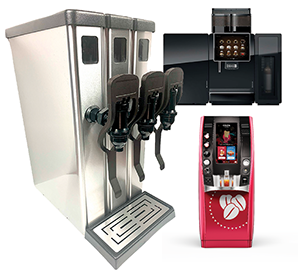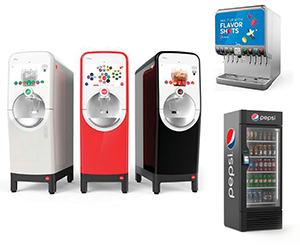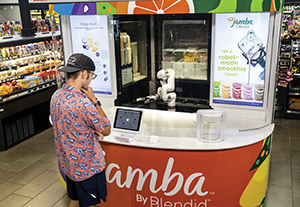 Clockwise from left, Coca-Cola's Taprite Variety Tower; Franke's A1000 Flex coffee machine; and Costa's Smart Café.
Clockwise from left, Coca-Cola's Taprite Variety Tower; Franke's A1000 Flex coffee machine; and Costa's Smart Café.
Imagine a world where a robot darts inside a kiosk and makes you a green smoothie with fresh ingredients, or you walk up to a coffee machine and with a couple of taps, a steaming flat white is made exactly to your preference (a double espresso shot, 2% milk and a half flavor pump of pumpkin spice, thank you). Or you open a mobile app to control a soda machine, making yourself a sparkling water with three different flavor shots, hold the ice.
Well, this futuristic beverage world is reality, thanks to recent beverage equipment innovations entering the convenience store scene. Although operators can choose from an array of different machines offering all types of drink combinations, automation and customization are similar threads running through today’s sophisticated beverage equipment.
“The growth opportunity with unattended retail solutions is immense,” said Greg Herman, senior marketing director, beverage innovation for PepsiCo Foodservice. “Since the pandemic, we’ve seen that consumers are prioritizing three things when they leave home: convenience, simplicity and low-contact interactions. That said, they do not want to sacrifice choice.”
These consumer preferences were swirling around the convenience retailing industry prior to the COVID-19 pandemic, but once lockdowns ensued and new ways of shopping emerged, customization and automation were no longer nice-to-haves but must-haves.
“The convenience factor has become something else with the pandemic,” said Brittany Tresemer, marketing director at Franke, which provides fully automatic coffee machines for retailers. “[Consumers] want to be able to have something that they know is fresh, high quality but super convenient.”
Since the pandemic, we’ve seen that consumers are prioritizing three things when they leave home: convenience, simplicity, and low-contact interactions."
LET’S GRAB COFFEE
In July 2021, Franke launched its A1000 Flex coffee machine, and it’s been a hit product with convenience stores. The machine makes espresso-based beverages, along with fresh bean-to-cup coffee, and it even has a powder hopper for hot chocolate.
“[Operators] want to see the biggest return in the smallest amount of space,” said Tresemer. “This machine meets that unique need and has been a tremendous success.”
The A1000 services different customer bases as well, she said. For the customer wanting a simple, fresh cup of coffee, the machine can take care of them, while also providing robust options for the customer who wants a specialty espresso drink, made exactly to their preference.
“[Operators] want to be able to offer good coffee. In fact, that’s one of the things that people were leaving their house for during the pandemic—to have a coffee experience that they couldn’t recreate at home,” Tresemer said. “They’re expecting a little bit of an elevated experience now.”
7-Eleven bills itself as the “OG To-Go Since 1964” coffee destination, and the company claims to have invented to-go coffee in 1964 at a Long Island, New York, store. 7-Eleven takes the freshness level of its coffee seriously, sourcing its beans from around the world. Its Evolution Stores offer customers that elevated coffee experience with an array of java options, focusing on customization.
“For coffee lovers, these stores feature custom espresso drinks, cold brew coffee and a second self-serve espresso machine where we’ll test specialty items such as cold foam, dirty chai, horchata latte and more,” said Molly Long, vice president of store evolution and design at 7-Eleven.
 Clockwise from left, Coca-Cola's Freestyle 9100; PepsiCo's Flavor Shots and Quik Pick.
Clockwise from left, Coca-Cola's Freestyle 9100; PepsiCo's Flavor Shots and Quik Pick.
For operators looking for a lower-cost coffee program, Coca-Cola offers the Taprite Variety Tower, manufactured by Aalberts, for beverages, including coffee, tea and lemonade. The tower is similar to an urn, but it connects to and pours from a bag-in-box product. The equipment provides superior ratio control and reliability and is easy to install and service, according to Melinda Pritchett, director of category strategy and innovation at The Coca-Cola Company.
Coca-Cola offers Barista Bros. iced coffee products to go along with the tower, and the products can also be dispensed from a legacy fountain machine. “This is a great solution for customers looking for a less labor-intensive iced-coffee program,” said Pritchett.
In 2019, Coca-Cola acquired Costa, a U.K. based coffee business with operations in more than 30 countries, and debuted Costa coffee this year in the U.S. as a “total coffee brand” that includes served and self-serve options for operators.
One of the options is Costa Smart Café, an autonomous coffee maker that makes hot and cold drinks using fresh beans ground inside the machine, as well as fresh milk also frothed inside the maker. It can make 100-plus drinks before human assistance is needed.
“[It’s] essentially an unmanned coffee shop in a box,” said Pritchett.
Unattended retail solutions can help fill various gaps, namely helping to fill holes created by ongoing staffing challenges within the industry."
SODA SCENARIOS
Cold dispensed beverage machines have been traditionally self-serve at convenience stores for years, but what has evolved in the category since the pandemic is customization. PepsiCo Flavor Shots enhance a traditional soda fountain by allowing the consumer to dispense four flavors—vanilla, cherry, lemon and raspberry—into beverages.
“This is where unattended retail solutions bring value,” said Herman. “Solutions help to meet consumer desire to shop at their own pace while getting a variety of options.”
Coca-Cola has a similar customization offer—a prism valve, manufactured by Cornelius, that dispenses three different carbonated or non-carbonated beverages plus sparkling or filtered water from each valve of a traditional beverage fountain. The valve can typically be installed in less than an hour and is available as a retrofit kit or can be added to new equipment. It has the option to be self-serve or crew-serve.
"This capability increases variety and consumer choice in the same footprint,” said Pritchett.
For operators wanting even more options for their customers, Coca-Cola’s Freestyle machines offer multiple beverage categories and flavors in a small footprint. Coca-Cola Freestyle 9100 can make more than 100 beverages across eight beverage categories, and during the pandemic, Coca-Cola rolled out a mobile pouring feature. Accessible via a mobile app, customers scan a QR code, which turns their phones into a remote control for the dispenser. The smaller Coca-Cola Freestyle 7100 is a countertop model that offers over 80 beverages across six categories.
PepsiCo is testing an unattended vending solution called Quik Pick, which transforms a standard cooler into a digital experience, where customers can browse, return and buy several products simultaneously. Consumers use their card or mobile wallet to unlock the cooler, then pick out (or put back) as many drinks as they like. Once they shut the door, their card is charged.
“An unattended solution like Quik Pick could bring tremendous value to convenience store settings, allowing consumers to shop at their own pace while still getting the variety of products they seek,” said Herman.
Knowing that our customer base is looking for a healthy on-the-go offering, these machines offer greater variety to them with a high-quality product that people are familiar with."
SMOOTH MOVES
In late summer, Love’s Travel Stops added a robotic smoothie maker to its Williams, California, location. The Jamba by Blendid kiosk is an 8-feet-by-8-feet, fully autonomous, contactless machine that makes smoothies using fresh ingredients. It can handle up to nine orders at a time received from a tablet at the kiosk or mobile orders.
“Knowing that our customer base is looking for a healthy on-the-go offering, these machines offer greater variety to them with a high-quality product that people are familiar with,” said Joe Cotton, vice president of foodservice at Love’s Travel Stops.
According to Vipin Jain, CEO and co-founder of Blendid, the machines tackle a variety of challenges and opportunities c-store operators face, including labor issues, fresh-food options and working within a small footprint.
“This is a strategic expansion into travel stops. We think there is a very dire need for good quality food options, 24/7, which is exactly what our kiosk is there for,” said Jain.
If c-stores wanted to add a full-service smoothie operation, they would need ample space in their store, not to mention a trained staff to run the operation.
“[With a] Blendid kiosk, you can put everything in 100 square feet,” Jain said. “It becomes a very attractive option in c-stores where space is a big challenge. Working with Love’s has been a phenomenal tactic because we are tackling a standard store layout with Love’s.”
Although the kiosk is self-cleaning to an extent—it washes the jars after making each smoothie—store employees will need to clean the unit daily. That involves surface wiping and restocking all the dispensing bins that house the fresh ingredients used to make the drinks.
 A California Love's Travel Stops location now has a Jamba by Blendid kiosk.
A California Love's Travel Stops location now has a Jamba by Blendid kiosk.
PepsiCo’s Herman says this is where autonomous solutions benefit convenience store operators.
“Unattended retail solutions can help fill various gaps, namely helping to fill holes created by ongoing staffing challenges within the industry,” said Herman. “Additionally, the tech utilized in these solutions can help capture data about consumer habits and preferences to help inform growth opportunities.”
Love’s plans on adding these kiosks to three to five locations in California, with the possibility of expanding to additional markets, although there are no immediate plans to do so.
“Blendid’s AI technology and state-of-the-art robotics helps get our drivers (both professional and casual) back on the road faster with a healthier food choice prepared exactly to their specific wants,” said Cotton.
Personalization was Jain’s motivating factor behind co-founding Blendid, and he imagines a future where consumers enter a robotic food court with multiple food choices, and the system knows who the customer is and prepares customized food based on their taste, allergies and food preferences.
“That’s the future we want to create, where the food is highly personalized, highly customized to your taste, body and to your gut and your immune system, keeping your body and mind fresh and energized,” said Jain.
Cheers to the future!